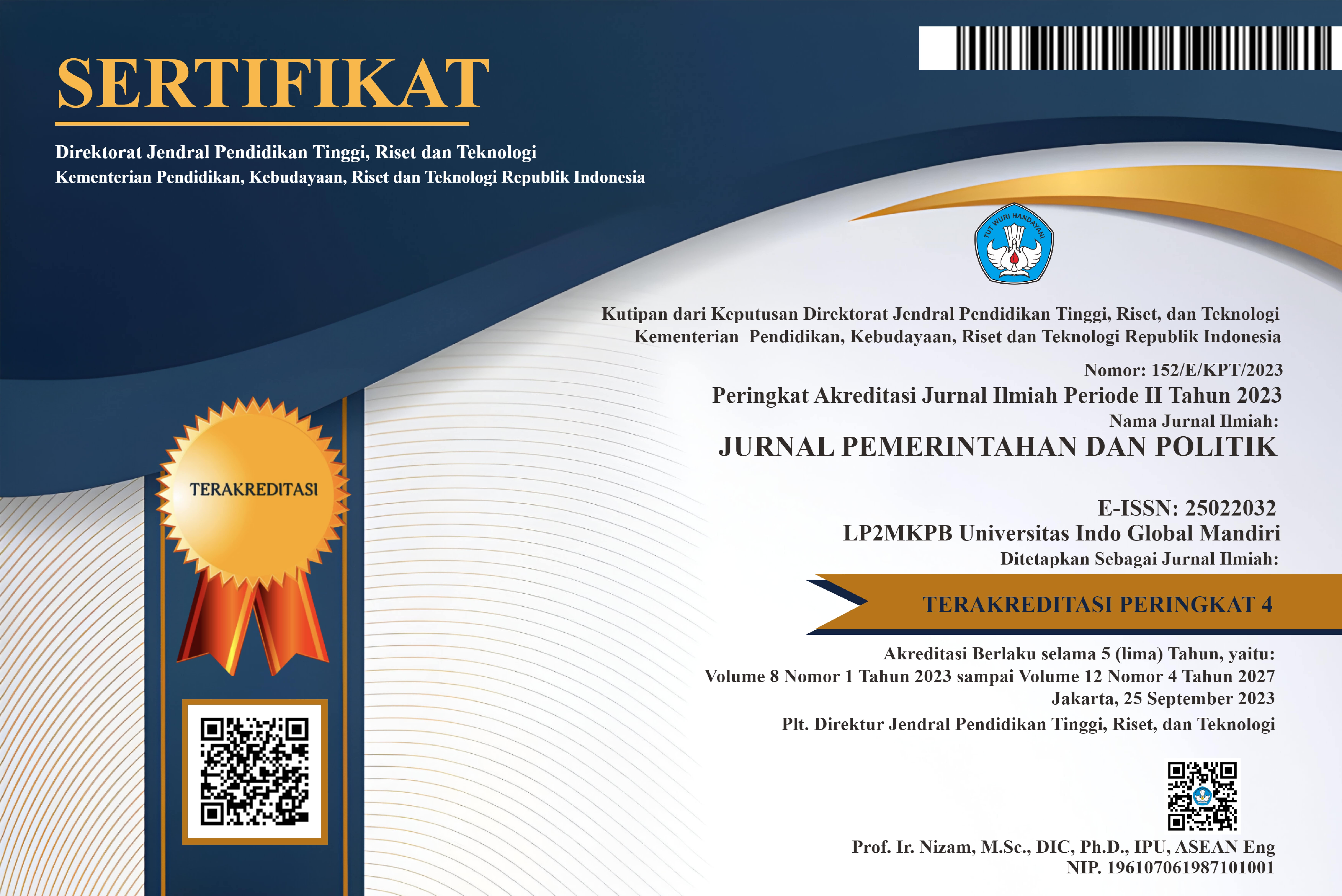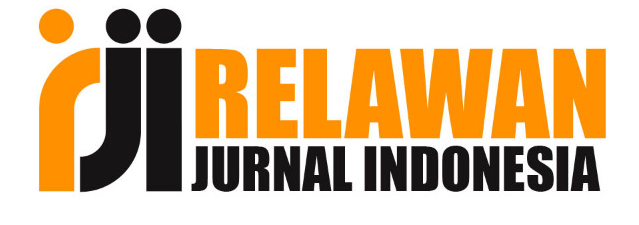The Political Parties Coalition Behaviour in Election: A Meta-Analysis
DOI:
https://doi.org/10.36982/jpg.v8i3.3111Keywords:
Political Parties, Coalitions Behaviour, Election, Meta-AnalysisAbstract
The formation of political party coalitions can be applied productively to patronage democracy, but this requires a
broader comprehensive study and the addition of new conceptualizations. Therefore, this study aims to determine the development of research on the theme of political party coalition behavior from 2015 to 2021 indexed by Scopus. This study uses a scoping review method. The source of this research data comes from the Scopus database. The findings in this study that the coalition behavior of political parties will not be separated from the topic of voting behavior and the electoral system, this is evident in this study. The political parties in building coalitions must consider the level of electability by looking at behavior in the voters. Moreover, the electoral system will determine whether political parties need to form coalitions or not if they want to participate in electoral contestation. Furthermore, parliamentary elections and proportional representation are topics that have opportunities as novelties for future research related to this themes. Furthermore, Indonesia (southeast asia), Spain, Norway (Europa), Uruguay and Colombia (South America) have recently paid great attention to research on the political parties coalition behavior. The implications of the findings of this study are as a form of a reference for knowledge regarding the study of political parties. More than that, it is important to describe these findings because they can classify world research which so far has only been limited to individual findings.
References
Amaliatulwalidain, Putri, D. E., & Kencana, N. (2022). Peran Politik Perempuan Pada Dewan Pimpinan Cabang Partai Persatuan Pembangunan Kota Palembang. Jurnal Pemerintahan Dan Politik, 7(1), 40–46.
Ananda, F. R. (2021). Daftar negara yang Jadikan Riset Sebagai Panglima Sains. Okezone.Com.
Bahnsen, O., Gschwend, T., & Stoetzer, L. F. (2020). How do coalition signals shape voting behavior? Revealing the mediating role of coalition expectations. Electoral Studies, 66. https://doi.org/10.1016/j.electstud.2020.102166
Bicu, I., & Peter, W. P. (2021). Elections during COVID-19: considerations on how to proceed with caution BY. Institute for Democracy and Electoral Assistance (IDEA).
Bruhn, K. (2021). When opposites attract: Electoral coalitions and alliance politics in Mexico. Mexican Studies - Estudios Mexicanos, 37(3), 451–475. https://doi.org/10.1525/msem.2021.37.3.451
Bulqiyah, H., Kartikasari, D. W., & Taek, P. A. G. (2023). Karakter Pemilih Pemula di Kabupaten Tuban: Adaptasi Budaya Politik Sekolah. Jurnal Pemerintahan dan Politik, 8(2), 87-93.
Cancela, J., & Geys, B. (2016). Explaining voter turnout: A meta-analysis of national and subnational elections. Electoral Studies, 42, 264–275.
Copeland, L., & Boulianne, S. (2022). Political consumerism: A meta-analysis. International Political Science Review, 43(1), 3–18.
Decker, F., & Adorf, P. (2018). Coalition politics in crisis?: The German Party System before and after the 2017 federal election. German Politics and Society, 36(2), 5–26. https://doi.org/10.3167/gps.2018.360202
Duch, R. M., May, J., & Armstrong, D. A. (2010). Coalition-directed voting in multiparty democracies. American Political Science Review, 104(4), 698–719. https://doi.org/10.1017/S0003055410000420
Eberl, J.-M., & Plescia, C. (2018). Coalitions in the news: How saliency and tone in news coverage influence voters’ preferences and expectations about coalitions. Electoral Studies, 55, 30–39. https://doi.org/10.1016/j.electstud.2018.07.004
Febriyanti, D., & Zubaidah, S. (2023). Bibliometrik Pengukuran dan Manajemen Kinerja di Indonesia. Jurnal Pemerintahan Dan Politik, 8(1), 55–59.
Golder, S. N. (2005). Pre-electoral coalitions in comparative perspective: A test of existing hypotheses. Electoral Studies, 24(4), 643–663.
Haselmayer, M., & Jenny, M. (2018). Friendly fire? Negative campaigning among coalition partners. Research and Politics, 5(3), 1–9. https://doi.org/10.1177/2053168018796911
Hendrawan, A., Berenschot, W., & Aspinall, E. (2021). Parties as pay-off seekers: Pre-electoral coalitions in a patronage democracy. Electoral Studies, 69(November 2019), 102238. https://doi.org/10.1016/j.electstud.2020.102238
Hiller, T. (2018). Excluded coalitions and the 2013 German federal election. Applied Economics Letters, 25(13), 936–940. https://doi.org/10.1080/13504851.2017.1386275
Johnson, A. F., Pollock, W., & Rauhaus, B. (2020). Mass casualty event scenarios and political shifts: 2020 election outcomes and the US COVID-19 pandemic. Administrative Theory & Praxis, 42(2), 249–264. https://doi.org/10.1080/10841806.2020.1752978
Kalaycioglu, E. (2016). The conundrum of coalition politics in Turkey. Turkish Studies, 17(1), 31-38.
Kaminski, M. M. (2018). Spoiler effects in proportional representation systems: evidence from eight Polish parliamentary elections, 1991–2015. Public Choice, 176(3–4), 441–460. https://doi.org/10.1007/s11127-018-0565-x
Kellam, M. (2017). Why pre-electoral coalitions in presidential systems? British Journal of Political Science, 47(2), 391–411.
Leemann, L., & Mares, I. (2014). The adoption of proportional representation. Journal of Politics, 76(2), 461–478. https://doi.org/10.1017/S0022381613001394
Lewis, B. D. (2020). How do mayors get elected? The causal effects of pre-electoral coalitions on mayoral election outcomes in Indonesia. Local Government Studies, 46(3), 394–413. https://doi.org/10.1080/03003930.2019.1627334
Meriläinen, J., & Tukiainen, J. (2021). The Advantage of Incumbents in Coalitional Bargaining. Legislative Studies Quarterly. https://doi.org/10.1111/lsq.12362
Moeis, A. O., & Sutrisno, A. (2019). Social network analysis of the pilkada serentak 2018: Towards national coalition in the 2019 indonesia’s general election. 2019 Asia Pacific Conference on Research in Industrial and Systems Engineering,
APCoRISE 2019, 2019–2022. https://doi.org/10.1109/APCoRISE46197.2019.931
Mongeon, P., & Paul-Hus, A. (2016). The journal coverage of Web of Science and Scopus: a comparative analysis. Scientometrics, 106(1), 213–228.
Morini, M., & Loveless, M. (2021). Losers together? Grand coalitions in the EU member states. Rivista Italiana Di Scienza Politica, 51(3), 404–418. https://doi.org/10.1017/ipo.2021.12
Munn, Z., Peters, M. D. J., Stern, C., Tufanaru, C., McArthur, A., & Aromataris, E. (2018). Systematic review or scoping review? Guidance for authors when choosing between a systematic or
scoping review approach. BMC Medical Research Methodology, 18(1), 1–7.
Panda, I., Maharana, B., & Chhatar, D. C. (2013). The journal of information literacy: A bibliometric study. International Journal of Scientific and Research Publications, 3(3), 1–7.
Plescia, C., & Aichholzer, J. (2017). On the nature of voters’ coalition preferences. Journal of Elections, Public Opinion and Parties, 27(3), 254–273. https://doi.org/10.1080/17457289.2016.1270286
Plescia, C., & Aichholzer, J. (2017). On the nature of voters’ coalition preferences. Journal of Elections, Public Opinion and Parties, 27(3), 254-273.
Plescia, C., & Kritzinger, S. (2022). When Marriage Gets Hard: Intra-Coalition Conflict and Electoral Accountability. Comparative Political Studies, 55(1), 32–59. https://doi.org/10.1177/00104140211024307
Putra, H. P. (2023). Pengaruh Isu Kampanye Terhadap Preferensi Pemilih Milenial Pada Pemilu Tahun 2019 Di Sumatera Barat. Jurnal Pemerintahan Dan Politik, 8(2), 115–122.
Renwick, A., & Pilet, J.-B. (2016). Faces on the ballot: The personalization of electoral systems in Europe. Oxford University Press.
Sagepub. (2022). Aims and Scope. Journals.Sagepub.Com.
Schermann, K., & Ennser-Jedenastik, L. (2014). Coalition policy-making under constraints: Examining the role of preferences and institutions. West European Politics, 37(3), 564–583.
Schuck, A. R. T., Boomgaarden, H. G., & de Vreese, C. H. (2013). Cynics all around? The impact of election news on political cynicism in comparative perspective. Journal of Communication, 63(2), 287–311.
Sciencedirect. (2022). Aims and scope. Sciencedirect.Com.
Scimago. (2022a). Electoral Studies. Scimagojr.Com.
Scimago. (2022b). Party Politics. Scimagojr.Com.
Shin, E. (2019). A model of pre-electoral coalition formation. Games and Economic Behavior, 118, 463–485.
Smets, K., & van Ham, C. (2013). The embarrassment of riches? A meta-analysis of individual-level research on voter turnout. Electoral Studies, 32(2), 344–359. https://doi.org/https://doi.org/10.1016/j.electstud.2012.12.006
topuniversities. (2022). About Alma Mater Studiorum - University of Bologna. Topuniversities.Com.
Van der Meer, T., & Hakhverdian, A. (2017). Political trust as the evaluation of process and performance: A cross-national study of 42 European countries. Political Studies, 65(1), 81–102.
Van der Pas, D. J., & Aaldering, L. (2020). Gender differences in political media coverage: A meta-analysis. Journal of Communication, 70(1), 114–143.
Van Eck, N., & Waltman, L. (2010). Software survey: VOSviewer, a computer program for bibliometric mapping. Scientometrics, 84(2), 523–538. https://doi.org/https://doi.org/10.1007/s11192-009-0146-3
Zoizner, A. (2021). The Consequences of Strategic News Coverage for Democracy: A Meta-Analysis. Communication Research, 48(1), 3–25. https://doi.org/10.1177/0093650218808691
Zubek, R., & Klüver, H. (2015). Legislative pledges and coalition government. Party Politics, 21(4), 603–614.









